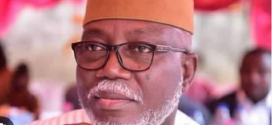For sometimes now, I have consciously resisted the temptation to join
opaque debates seeking to pin the misfortune of the PDP in the last election on former Kwara State Governor, Dr Abdulfatah Ahmed’s alleged non-performance. The skewed, anecdotal analyses are driven by ruling party stalwarts and, unfortunately, by members of the PDP who possibly have personal issues with the former governor.
If left unchallenged, this sentimental analyses of a complicated event risk acceptance by an unsuspecting populace. It is in this wise that I seek to, as a moral obligation having been part of that administration for eight years, place in proper perspective how Ahmed and his administration contributed or otherwise to the electoral misfortune that befell us. And this is not in any way to exonerate Ahmed as a leader then, but somewhat correct the falsehood created in some circles, painting him as an underachiever in governance. On the contrary, the strides are abundant. We downplayed achievements because they were campaign promises made and fulfilled. This is what good governance is about globally.
Let’s start by asking those who judge him as an underachiever the indices for their judgment. Determining whether a man performs in office or not should be based on specifics as available resources against accomplishments; what opportunities were made available for every segment of society and how resourceful the man was. These are some standard indices for evaluating performance, and not some skewed theories spewed from disgruntled minds. You judge non-performance based on campaign promises made but unfulfilled not wanton, uninformed assessments that are unrelated to resources. No campaign pledge from human capital development, infrastructure and enhancing the economy was left unfulfilled.
It would, for instance, be irrational to benchmark a governor in Kwara with such states like Lagos, Bayelsa and Rivers states whose quarterly allocations and internally general revenues are almost times what Kwara makes in a year.
No! You judge the man in Lagos based on what is available to him and do the same for the man elsewhere.
What resources were available to Ahmed while in office? Let us agree he was fortunate that in the early part of his administration, the national economy, which is the feeding pot for all states of the federation, was stable. So he paid salaries as at when due. But should we forget that as at that time, allocations from the Excess Crude Account, which used to yield some N3 billion to the state every quarter had ceased?
Let’s not forget that at that time, the new administration implemented the approved minimum wage, that moved basic salary for the least paid civil servant from N8,000 to N18,000. Still, Ahmed ensured the completion of many projects initiated by the previous administration. No inherited project was left uncompleted. Ahmed inherited and completed the Offa garage-Micheal Imoudu Road, Ahmadu Bello Way, Asa Dam roads in Ilorin and Ilesha Barbara-Kosubosu road in Kwara North etc. The former governor also completed the inherited Ilorin metropolitan water project, the Harmony Advanced Diagnostic Centre, International Aviation College and the Cargo Terminal in line with his campaign promises. Yet these were ‘not his signature projects’, so to say. If he was to be a clog in the wheel of progress, would he have completed those projects in an unfortunate but wasteful era where governors abandon their precedesors’ signature projects for primitive political expediency? If he was a clog in the wheel of progress, would he also have enhanced the inherited education policy of “every child counts” by making pre-tertiary education free?
State workers also got a great deal under Ahmed. In that first term, Ahmed also introduced car loans for civil servants in the state, the first of its kind in the previous 20 years to his tenure. It was in that first term that he began looking at how to reinvigorate the internal revenue-generating capacity of the state.
By the time of the 2015 elections, we all knew Nigeria was heading for a significant economic crisis, and inevitably the recession came and affected all of us. But what did Ahmed do? His rejig of the internal revenue generation strategy yielded a positive result and became the saving grace for the state at such a dire time. Thus while many states were struggling to survive, Ahmed paid the new minimum wage as agreed with labour in the state, and ensured that but for local government workers, no civil servant in the state’s employment was sacked or denied his or her monthly salary.
Abdulfatah Ahmed introduced a novel way of handling capital projects during that turbulent period. This was when many states had left capital projects to concentrate on paying workers’ salaries. Yet we implemented projects like the multi-billion naira Geri-Alimi Diamond Underpass and other road projects such as the 34-kilometre Share Oke Ode Road, Anilelerin Road, Offa, Arandun-Rore-Ipetu Road, Oloro Township Road, Oke Rimi Road, Oro, Adualere-Isale Koko Road, Ilorin, Offa-Irra Road, Oke-Andi-Obafemi-Taoheed Road, Henry George Roundabout-Agbo-Oba Road, Oniju Street, Babanloma, Erin-Ile Ilemona Road, and Pakata-Sooto Anifowoshe Road, including the rehabilitation of Stadium Road, Ilorin, Ejiba Road, off Stadium Road, Umaru Audi-Fate Roundabout-Agric Roundabout to mention a few despite being economically hamstrung.
Again this time of global economic recession and cessation of fund from excess crude oil was when Dr Ahmed embarked and completed the International Vocational Technical and Entrepreneurial College (IVTEC), Ajase Ipo in 2017, modelled recommended by Vice President Osinbajo for other states to emulate.
It was also at this time that former Gov Ahmed constructed the Engineering complex at the Kwara State University, School of Business and Governance in Ilorin and commenced satellite campuses of KWASU at Osi and Ilesha Baruba.
It was also at this time that ex-Gov Ahmed expanded the Community Health Insurance Scheme to cover the whole of Kwara. The administration also started and completed the magnificently imposing new secretariat complex.
We know that those spreading the nonperformance narrative are probably those who feel, rightly or wrongly, that they were not personally touched enough by Dr Ahmed. Hardly can anyone assuage these people because Ahmed believes that “enikan ki je ki ile fe”. Such people should not expect to enjoy patronage forever but must instead give room to new entrants in the overall interest of Kwara.
The truth remains that Ahmed left behind a great legacy in the state. The KWIRS remains today a national model. Just like the capital project funding model(IF-K). Just like the State Health Insurance Scheme, which has won national and international accolade for the state. The Shonga Farms which the administration inherited and supported fully remains a proud legacy.
Instead of dwelling on mischievous articles written by faceless people, let us dwell on the words of Professor Khama Rogo, Lead Health Sector Specialist and Head of the World Bank Group’s Health in Africa Initiative when he came to Ilorin for the launch of the Health Insurance Scheme: “Now in Kwara, you can look after your health without the fear of going into poverty. It is the restoration of dignity to Kwarans because it is in this area of health provision that the rights and privileges of our women and children are tramped upon more than elsewhere. Now, no more shall mothers and children go into health facilities as beggars but as owners and employers of the facility!
“I’m thrilled I’m here; I don’t know what Kwarans do when they are happy. But in Kenya, I know what we do; we dance and run, we run so fast and so far”.
Oba was CPS to former Governor Abdulfatah Ahmed
 Hottestgistnaija.com
Hottestgistnaija.com




